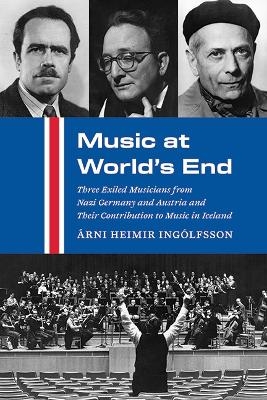
Music at World's End
Three Exiled Musicians from Nazi Germany and Austria and Their Contribution to Music in Iceland
Seiten
2025
State University of New York Press (Verlag)
9798855800685 (ISBN)
State University of New York Press (Verlag)
9798855800685 (ISBN)
- Titel nicht im Sortiment
- Artikel merken
A fascinating story of how three musicians, who escaped the Nazis, inspired Iceland's modern classical music.
In Iceland in the 1930s, classical music was only beginning to be seriously practiced, at the same time when musicians of Jewish heritage were fleeing Nazi Germany and Austria. Despite the country's strict immigration policy, three outstanding young musicians were allowed to settle there: Robert Abraham, Heinz Edelstein, and Victor Urbancic. Their influence on Iceland's music scene as conductors, instrumentalists, teachers, and scholars proved invaluable. In Music at World's End, the first in-depth study of the lives and careers of these three musicians, musicologist Árni Ingólfsson examines their formative years in Germany and Austria, their dramatic escapes from the Nazi regime, and their triumphs and frustrating setbacks in their new homeland, a country in which Jews were virtually unknown. This fascinating case study is a valuable addition to studies of musical exile during World War II and beyond.
In Iceland in the 1930s, classical music was only beginning to be seriously practiced, at the same time when musicians of Jewish heritage were fleeing Nazi Germany and Austria. Despite the country's strict immigration policy, three outstanding young musicians were allowed to settle there: Robert Abraham, Heinz Edelstein, and Victor Urbancic. Their influence on Iceland's music scene as conductors, instrumentalists, teachers, and scholars proved invaluable. In Music at World's End, the first in-depth study of the lives and careers of these three musicians, musicologist Árni Ingólfsson examines their formative years in Germany and Austria, their dramatic escapes from the Nazi regime, and their triumphs and frustrating setbacks in their new homeland, a country in which Jews were virtually unknown. This fascinating case study is a valuable addition to studies of musical exile during World War II and beyond.
Árni Heimir Ingólfsson is an independent scholar, lecturer, and pianist. He is the author of several books, including Jón Leifs and the Musical Invention of Iceland, and coeditor of Sounds Icelandic: Essays on Icelandic Music in the 20th and 21st Centuries.
List of Illustrations
Note on Spelling and Naming
Introduction: Lives Saved through Music
1. Beginnings
2. Without a Home
3. World's End
4. "A Country Free of Jews..."
5. New Realities
6. Work to Be Done
7. Conflict and Controversy
8. Endings
Postlude
Acknowledgments
Notes
Bibliography
Index
| Erscheinungsdatum | 03.01.2025 |
|---|---|
| Zusatzinfo | 59 Illustrations, black and white |
| Verlagsort | Albany, NY |
| Sprache | englisch |
| Maße | 152 x 229 mm |
| Gewicht | 581 g |
| Themenwelt | Kunst / Musik / Theater ► Musik ► Klassik / Oper / Musical |
| Geisteswissenschaften ► Geschichte | |
| ISBN-13 | 9798855800685 / 9798855800685 |
| Zustand | Neuware |
| Informationen gemäß Produktsicherheitsverordnung (GPSR) | |
| Haben Sie eine Frage zum Produkt? |
Mehr entdecken
aus dem Bereich
aus dem Bereich
Essays und Gespräche
Buch | Hardcover (2025)
Wallstein Erfolgstitel (Verlag)
CHF 29,90


